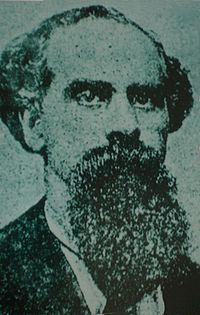Guillermo Tell Villegas | |
|---|---|
 | |
| President of Venezuela | |
| In office 28 June 1868 – 20 February 1869 | |
| Preceded by | Manuel Ezequiel Bruzual |
| Succeeded by | José Ruperto Monagas |
| In office 16 April 1870 – 27 April 1870 | |
| Preceded by | José Ruperto Monagas |
| Succeeded by | Antonio Guzmán Blanco |
| In office 17 June 1892 – 31 August 1892 | |
| Preceded by | Raimundo Andueza Palacio |
| Succeeded by | Guillermo Tell Villegas Pulido |
| Minister of Foreign Affairs of Venezuela | |
| In office 7 August 1863 – 21 January 1864 | |
| President | Juan Crisóstomo Falcón |
| In office 27 June 1868 – 24 February 1869 | |
| President | José Ruperto Monagas |
| Personal details | |
| Born | 1 January 1823 Valencia, Gran Colombia |
| Died | 21 March 1907 (aged 84) Valencia, Carabobo, United States of Venezuela |
| Political party | Liberal Party |
| Signature | |
Guillermo Tell Villegas (1 January 1823 – 21 March 1907) was a Venezuelan politician, lawyer, and writer. Among other government positions, he served as interim president of Venezuela in 1868, 1870 and 1892.[1] Starting his career in law, he became governor of Barinas in 1859[1] and afterwards held various roles in the government of Juan Crisostomo Falcon, including deputy in the Assembly of Victory, Minister of Interior and Justice,[1] and interim Foreign Minister of Venezuela. In 1864 and in 1866 was appointed to the Federal High Court.[1] Villegas participated in the La Genuina revolution in 1867, and was elected president of the Chamber of Deputies in 1868, where he openly opposed the government of Falcón. The Blue Revolution in 1868 removed Falcon from power,[1] and Villegas became Foreign Minister under President José Ruperto Monagas.[citation needed] In 1868 Villegas spent eight months as interim president of Venezuela, during which time he reinstated the Federal Constitution from 1864. After again serving as interim president and Minister of the Interior in 1869, in 1870 he was interim president a third time while Monagas fought the Liberal Revolution. The revolution was successful, and Villegas retired from active politics after ceding the presidency.[1]
Villegas went into education after his retirement, and in 1876 he founded the school La Paz. He published several reports and educational textbooks in the 1880s, and in 1889 President Juan Pablo Rojas Paul named him Minister of Public Instruction. In 1892 Villegas was appointed the president of the Federal Council.[1] Villegas served as interim President of Venezuela for the final time[1] in 1892, when Raimundo Andueza Palacio was in absentia while dealing with the outbreak of the Legalist Revolution.[1] Villegas resigned later that year and was succeeded by his nephew Guillermo Tell Villegas Pulido.[2] Returning to education, he published the first Venezuelan popular instruction book on literature, science, and fine arts in 1895.[1] In 1901, he was elected as a member of the National Academy of History at the age of 80.[1]